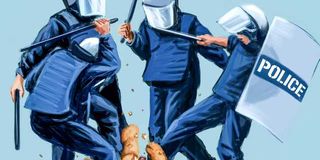MAN TALK: Violence towards boys is thriving here in our soil

Police brutality. PHOTO | COURTESY
What you need to know:
- I'm afraid because I've seen the pictures, videos and read the stories of men getting assaulted past curfew hours.
- As a man, I risked assault and death during this period. Walking around was a risk. Staying in my house too. Basically being alive as a young man is an inherent death risk 24/7.
- There's not a single voiceless person that exists. Silent maybe, but not voiceless. Hold police to account.
The past few weeks have been rough since the curfew was implemented as part of the government measures to fight Covid. Every time I'm out of the house doing something, any time close to 4 pm, I get nervous and I'm scared.
Yet, I live in a decent middle-class neighbourhood in Nairobi. I'm afraid because I've seen the pictures, videos and read the stories of men getting assaulted past curfew hours. As a man, I risked assault and death during this period. Walking around was a risk. Staying in my house too. Basically being alive as a young man is an inherent death risk 24/7.
There are multiple men and boys who didn't just have this fear. They lived our worst nightmare. They needlessly and senselessly died at the hands of the police.
Yassin Moyo, Khamis Juma, Calvince Omondi, David Kiiru, Peter Gacheru, Eric Ngethe, Idris Mukolwe, Ramadhan Juma, John Muli, Ibrahim Onyango are just a few of the known men who have died as a result.
One of the saddest of these already sob stories is that of Yassin Moyo. Yassin was a 13-year-old boy who was going to sit his KCPE exams this year. Yassin was shot 20 minutes past the curfew playing on his parent's third-floor balcony as he watched the police enforce the curfew. He had just made it to his teens, not something all children in his neighbourhood do, to have his life ended on a balcony where he was playing
Samuel Maina, who was two weeks ago assaulted by the police, who was not only assaulted but robbed by law enforcers, joins a long list of young men who will pay for Covid-19 with their bodies. Not from the disease but from violence meted out on them.
This ties into the bigger discussion online over the death of George Floyd, the African American who was killed by officers in Minneapolis as one of them knelt on his throat for eight minutes 46 seconds. His death has sparked countrywide riots and is a ticking time bomb here. We need to have a discussion on police brutality against young black men. This conversation affects poor young men more than anyone else and it's a discussion that everyone who reads this column should have.
A 2014 Study by Independent Medico-Legal Unit (IMLU) showed in numbers what we've known for years. The report showed that police were responsible for 67 percent (1,252) of the 1,868 gun-related deaths between 2009 and 2013 in six major urban centers, while armed criminals were responsible for only 14 percent (260).
In more than 67 percent of those cases, the police failed to explain the reasons for their involvement and reasons for their shooting. Only in six cases (0.3 percent) did the police respond when they were outnumbered and overrun by armed criminals. If one is caught up at midnight between two paths, one with thugs and another one with police officers, many would choose the thugs path as they are more likely to stay alive. If that doesn't jolt you, I don't know what will.
In this column, I delve to represent what's going on in men's lives and to boldly talk about the issues. It would be a disservice to all if I didn't broach the subject of men who are not sure if they will get home alive.
You know you live in a good neighbourhood in Kenya when something goes wrong and the first thing you do is call the police. Most people don't live in places like that. Most Kenyans have to weigh the pros and cons of calling the police and in most cases, the cons win. That's the country we live in. Some of us, decide to take to the streets to protest this injustice but I know that not everyone is comfortable taking this route.
What I know though is that we can all do something. There are many ways. Can you influence policy? Can you give money to the cause? Can you have this conversation on your pulpit? Why aren't you holding this discussion in your mosque? Are you a musician, actor, news anchor, or social media influencer? You have a voice, why aren't you using it?
Can you have the dialogue in your family WhatsApp group? There's not a single voiceless person that exists. Silent maybe, but not voiceless. Hold police to account.





